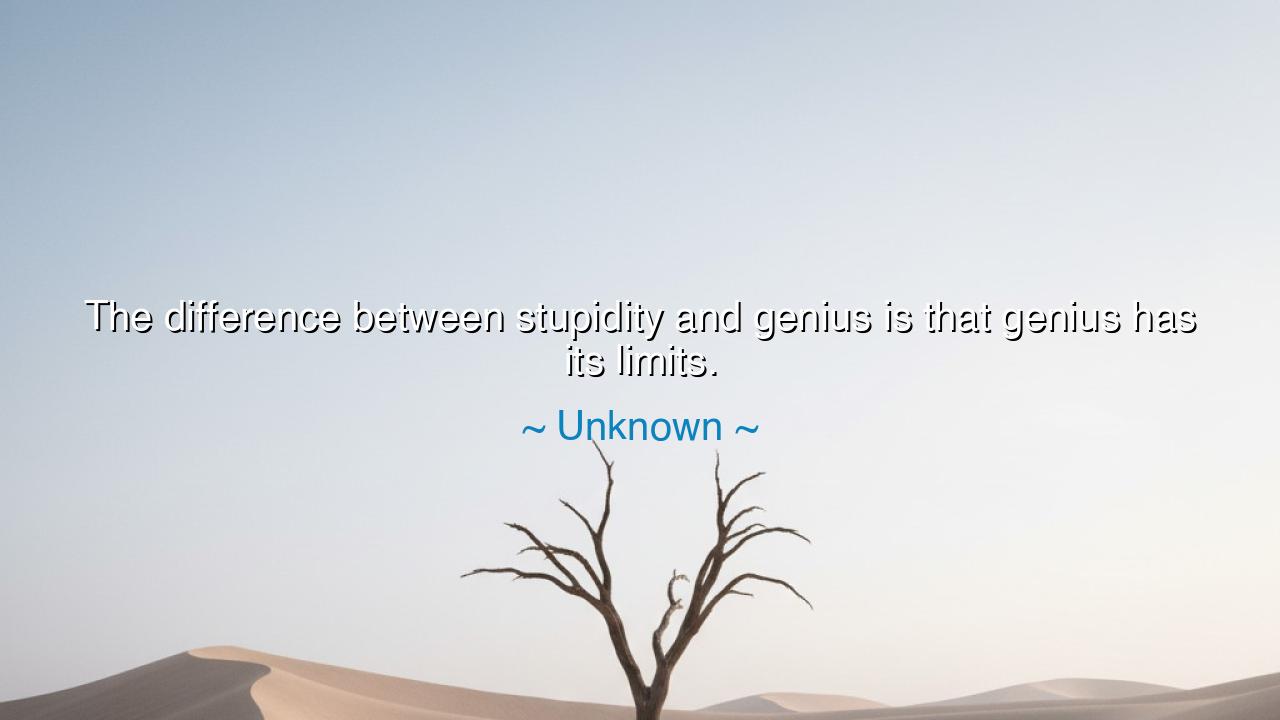
The difference between stupidity and genius is that genius has






“The difference between stupidity and genius is that genius has its limits.” — so goes the saying attributed to Unknown, though it has often been spoken in the name of Albert Einstein, that great revealer of truth. Whether or not the words came from his lips, their wisdom carries the weight of observation and the sting of irony. In this single line lies a mirror held up to the human condition: that while genius may soar to great heights, it remains bound by reason, while stupidity — reckless, thoughtless, and blind — knows no bounds at all. It is a warning, a lament, and a wry acknowledgment of the folly that too often governs the affairs of humankind.
The origin of this saying may be uncertain, but its spirit is ancient. Since the dawn of civilization, philosophers and sages have spoken of the gulf between wisdom and ignorance. The wise man builds with care, knowing the boundaries of his knowledge; the fool, imagining himself infinite, destroys through arrogance. To say that genius “has its limits” is not to insult it, but to praise its humility. The true genius knows where his knowledge ends, and where mystery begins. The fool, however, wanders without compass, convinced that his ignorance is illumination. Thus, the saying is both satire and truth — that the danger of stupidity lies not in its weakness, but in its boundless confidence.
Indeed, throughout history, the clash between genius and stupidity has shaped the destiny of nations. Consider the story of Galileo Galilei, the astronomer who saw through the veil of heaven and dared to proclaim that the Earth moved around the Sun. His genius was vast — but bounded by truth, by the evidence of observation, by reverence for reason. Yet he was silenced by those whose stupidity knew no limits, who mistook ignorance for faith and arrogance for piety. The tragedy of Galileo is not merely that he suffered for truth, but that humanity’s blindness is often more powerful than its brilliance. Here, the quote finds its living image: genius restrained by reason, stupidity unchained by pride.
The saying also reveals a deep moral insight: that intelligence without humility is dangerous, but ignorance without awareness is catastrophic. Genius may err, but it corrects itself; stupidity persists. Genius questions, doubts, and learns; stupidity asserts, defends, and multiplies. Genius grows through reflection; stupidity thrives on repetition. In this sense, the words are not simply humorous — they are prophetic. They remind us that the greatest peril of humanity lies not in the limits of our intelligence, but in the limitlessness of our folly. For while wisdom builds the temple of progress, folly tears it down brick by brick.
And yet, even in this somber truth, there is a call to compassion. The wise know that ignorance is not evil in itself — it is the natural state of the mind before it learns. What turns ignorance into stupidity is pride, the refusal to see one’s own blindness. Thus, the remedy for this boundless foolishness is not scorn, but education, humility, and self-awareness. The one who knows how little he knows is already wiser than the one who boasts of all he thinks he knows. Genius is not merely brilliance; it is the courage to be teachable, the grace to listen, the wisdom to doubt one’s own certainty.
Consider, then, the story of Socrates, that humble philosopher who declared himself the wisest man in Athens because he knew that he knew nothing. His genius lay not in vast knowledge, but in limitless curiosity and boundless humility. The Athenians, confident in their cleverness, mocked him — and in their stupidity without limits, they condemned him to death. Yet his spirit outlived them, because his wisdom was grounded in truth, while their folly was chained to vanity. So too, this quote whispers through the ages: that true intelligence is self-limiting, while ignorance expands without measure, consuming all in its path.
So, my listener, take this teaching to heart. Be ambitious in learning, but humble in knowing. Genius may shine, but it is humility that keeps it pure. Question often, for doubt is the guardian of wisdom. Beware the arrogance that blinds, the certainty that deafens, the pride that pretends to know all things. Remember that wisdom begins not in knowledge, but in the admission of ignorance.
For in the end, this saying — “The difference between stupidity and genius is that genius has its limits” — is both a jest and a judgment. It mocks our pretensions and exhorts us to rise above them. It calls us to cultivate minds that know when to stop, hearts that know when to listen, and souls that seek truth rather than victory. For while stupidity may be infinite in its reach, wisdom — though bounded — is eternal in its light. And the world, if it is to endure, must learn to live by that light, lest it be consumed by the darkness of its own ignorance.






AAdministratorAdministrator
Welcome, honored guests. Please leave a comment, we will respond soon